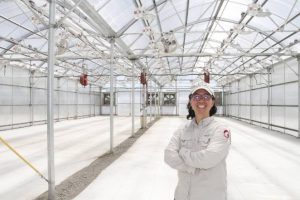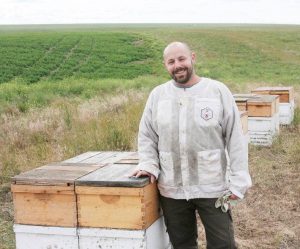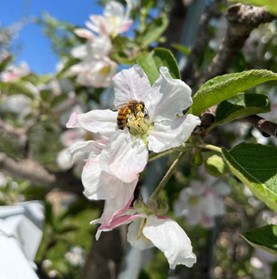Have wings, will travel
WSU bee program, honey production moving to Othello
- By Kathy Hedberg For Farm & Ranch
Laura Lavine, chairwoman of the Washington State University entomology department, stands inside a greenhouse in Othello, the site where the WSU honey bee research program will be moving. The Othello site has the added benefit of being in the rich agricultural area of the Columbia River Basin.
Brandon Hopkins, an entomology professor at Washington State University.
The latest buzz around the Washington State University campus comes from the relocation of honey bees and honey extraction equipment from Pullman to Othello.
Brandon Hopkins, a professor of entomology at WSU, said the consolidation of honey bees and equipment at Othello will support the school’s ongoing research into honey bees and honey production in central Washington.
“We’ve grown beyond our space in Pullman, so we had a fundraising campaign for a few years to get a new facility,” Hopkins said. When the price tag for a new Pullman research center came in at $26 million and continued to rise “it became clear we were not going to get enough money to build a building in Pullman. (The price) became increasingly far-fetched.”
When a facility became available in Othello and WSU received a large donation from a commercial beekeeping family in Washington and others, the decision was made to relocate.
Hopkins said the Othello site has the added benefit of being in the rich agricultural area of the Columbia River Basin. Each year, 15 to 30 undergraduates enroll in courses designed to further the study of honey bees, their environment and their sweet results.
The WSU honey bee program is in the process of moving equipment and materials from Pullman to Othello, including the large honey extractor that is used to separate honey from honeycombs. Hopkins estimates the facility will be in place and operating by the spring.
A large part of the WSU honey bee program involves research into colony collapse disorder that affects honey bee colonies through sudden colony death. The exact cause of colony collapse disorder is not known, although researchers suspect there are multiple reasons for it.
WSU has about 200 hives and each year transports about half of those to California, along with other honey bee producers, to help pollinate the almond orchards. Hopkins said some of the school’s research also takes place there.
In early spring, the hives are returned to the campus and honey is extracted about twice a year. It is sold online and at Ferdinand’s on WSU’s Pullman campus. Money raised from sales goes back into the bee program and allows students to work as they learn about bees. The money also funds the infrastructure that allows research to happen.
Although honey bee production in the United States has been around for hundreds of years, Hopkins said he has heard there are fewer people who are getting into the business.
“It’s a very difficult business,” he said. “A lot of beekeepers, if they have a bad year and lose their colonies, they have to make hard choices about investing millions of dollars in loans to build back up.”
As with other aspects of farming, smaller beekeepers tend to consolidate or sell out to larger corporations.
“The people that manage to keep their bees alive, it is profitable,” Hopkins said. “People that do it well make a good living.”










